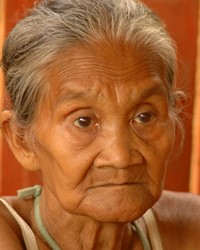Orang Dalam in Indonesia

Photo Source:
Tim Mowrer - Flickr
Creative Commons
|
Send Joshua Project a map of this people group.
|
| People Name: | Orang Dalam |
| Country: | Indonesia |
| 10/40 Window: | Yes |
| Population: | 4,500 |
| World Population: | 4,500 |
| Primary Language: | Kubu |
| Primary Religion: | Ethnic Religions |
| Christian Adherents: | 2.21 % |
| Evangelicals: | 0.83 % |
| Scripture: | Translation Started |
| Ministry Resources: | No |
| Jesus Film: | No |
| Audio Recordings: | Yes |
| People Cluster: | Melayu of Sumatra |
| Affinity Bloc: | Malay Peoples |
| Progress Level: |
|
Introduction / History
Kubu speakers live on the Indonesian island of Sumatra. The name "Kubu" comes from the word Ngumbu which means "elusive." They prefer to call themselves Orang Daram, which means "land dweller" or "river dweller."
The Orang Dalam are probably the descendants of a wandering Negrito people. Their ancestors first settled on the Lalan River. Today, they live primarily in the Jambi province of Sumatra Island.
What Are Their Lives Like?
The Orang Dalam are forest dwellers found primarily in swampy areas near various rivers. Most are involved in the farming of yams, maize, rice and sugar cane. Their fields are poorly kept. Jungle produce and small game provide most of their food. Their basic diet consists of wild pigs, fish, monkeys, bananas and yams.
The Orang Dalam usually live in settled villages called sirups. Their houses are built on platforms without any walls and are made with bamboo and leaves. Usually three to five houses form a village. An older person serves as chief but has no real authority.
Every Orang Dalam has a name; but this name is only known by members of the same sirup. People of other villages are simply referred to as "people of this or that little river." The villagers of one settlement rarely come into contact with those of another, since there are no feasts, "coming of age" ceremonies or other community gatherings.
The little contact they have with their Malay neighbors has traditionally been through silent trade. The Orang Dalam would take their goods to a place where Malay traders could look at them. The traders would then place the goods that they were willing to exchange nearby, then withdraw to a safe distance. If the deal was satisfactory, the Orang Dalam would take what was offered and vanish back into the brush.
Along with the tradition and simplicity of their material culture, the Orang Dalam are also lacking in social and religious development. Musical instruments of any kind and dancing are unknown to them.
What Are Their Beliefs?
The Orang Dalam practice various animistic rituals, such as curing ceremonies. (Animism is the belief that inanimate objects have spirits.) Their witchdoctors and shamans make offerings to the spirits for them.
What Are Their Needs?
The Orang Dalam are heavily dependent on what they can find in the forest. Logging is a threat to their very existence.
Prayer Points
Ask God to create an openness to following Christ that will not be hindered by community pressure.
Pray that God will provide contacts, strategies, and wisdom for workers so they can effectively reach the Orang Dalam.
Pray that the Holy Spirit will protect the small number of Orang Dalam Christians and use them to disciple others.
Ask God to raise up a strong multiplying church.